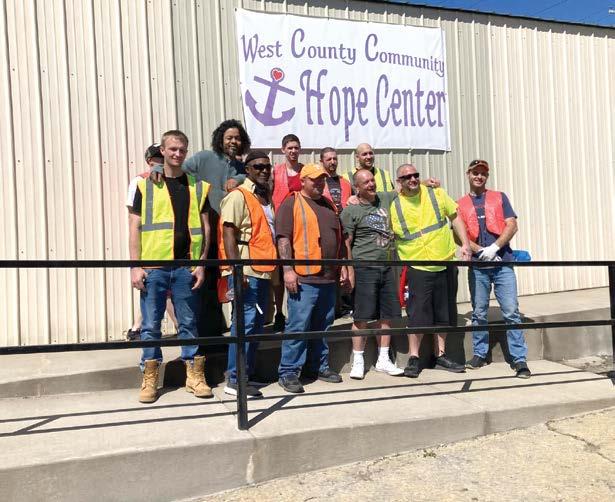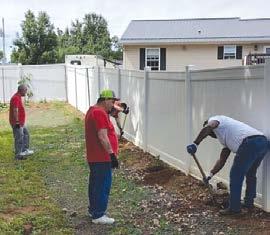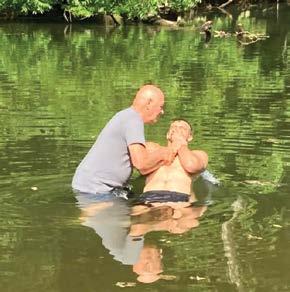
7 minute read
Building the Hope (Center)
by Jacob Clagg with Ken & Betty McIntyre
When Ken and Betty McIntyre came back from Haiti after six years in the field, they returned to their home in Farmington, Missouri, to find poverty, hunger, and hardship not dissimilar to what they left in Haiti. “It really was in Haiti that [we learned] that basic lesson: you cannot throw money at the problem and fix it,” Betty told me. “You have to go to the root cause. The critical thing is when people lose hope.” And so, after filing the paperwork to create a faith-based nonprofit in 2019, a group of individuals, including Ken and Betty, established the West County Community Hope Center in 2020, just before Covid hit.
Despite claiming to be semi-retired, Ken and Betty McIntyre are still busy people. They have big goals for the West County Community Hope Center, and during our interview, Betty spelled out their plans for the Hope Center and only God can bring hope to the hopeless.
Feeding the Hungry
The whole idea for the Hope Center started in a small book study group when they were reading The Insanity of God by Nik Ripken and Gregg Lewis. The book basically asked, “What’s God asking you to do that is insane to other people?” The group felt powerfully that God was asking them to transform the West County community, a school district that encompasses three towns, Leadwood, Irondale, and Frankclay. Betty explained, “They were all mining towns that dried up. The communities have changed so much, and they aren’t the communities we grew up in. Before, there were things to do and places to go, but now they are pretty depressed communities. Our school district feeds kids breakfast, lunch, and dinner at school. If they go home, they probably don’t have anything to eat.”
Because Covid shutdowns were in full swing and summer was fast approaching, many kids were unlikely to see the regular meals they relied on. And that was their impetus, to feed the kids. Soon after, a local produce provider called Betty and asked if the Hope Center wanted to pass out food boxes. At first, Betty could only think of 15 people that needed help. After reaching out to other pastors in the area, she called back and I said, “I want 30 boxes.” After some more checking she called back again and she said, “I want 60!” They ended up distributing 250 boxes per week.
Initially, because so many kids and teachers were out of school, the Hope Center had extra hands to help distribute. When fall came back around and school was back in session, they still had people in need of help, but far fewer people to help. “We were running off of old people! Retired people were working the Hope Center at this point and once you get a foot of snow, they can’t pass out boxes,” Betty said. This is when the West County Community Hope Center began the next major part of their mission.
God’s New Direction
In the town of Farmington there is a state prison, and prior to Covid, prisoners who didn’t have a place to go were released to a community supervision center to help them reintegrate. But during and after Covid, many of those released had no place to go, and were released on “homeless” status, which, as most people understand, massively increases their chances
of substance abuse and ending up back in prison. So, in partnership with the Farmington community supervision center, the Hope Center in Leadwood was able to work with some of the released men, giving them opportunities to do community service and letting them work to better their community.
“It was not the direction we intended to go, but it became an integral part of what we do,” Betty said. She described the entire endeavor as a “God thing” because the Hope Center was connected with Victor Glover of the Southeast Region, who has been pioneering how to help men both in and out of prison put their lives back together and become successful in their communities. Victor came and prepared the Hope Center for what God had for their future.
Now, much of what the Hope Center does revolves around the men who’ve recently come out of prison. “As we share God’s word with them, he gives them purpose and meaning, and they are seen as essential workers to the community,” Betty said.
The community has come to find these once incarcerated men as invaluable. Betty shared a story of Renaissance Rescue Ranch for horses in Farmington, where horses that were going to be killed or euthanized are cared for. Some of “the guys,” as Betty calls them, help around the ranch, tending to the horses. “Some of the guys are very good at that,” she said. “They love the horses. The ranch would hire some of these guys in a minute.”

For the guys, the Hope Center offers community service opportunities, a 12 steps program, and GED equivalency test. They’ve also partnered with other organizations like a job center, which helps the guys build their resumes to they can find more sustainable work and begin the process of gaining back their independence. Betty emphasized the importance of partnerships in the community and making connections for these guys. She said, “You have got to make connections with the services in your area. If they can’t get connected, they’re hopeless, they give up. They quit trying and I don’t blame them.”
On top of the social work, the Hope Center provides Christian services for the guys and their families including worship, devotionals, and baptisms, while making sure they meaningfully help the Buddhists, Muslims and atheists that also come through their doors.
The Hope Center provides these kinds of Christian services because they’ve recognized that the church building has become a barrier for many people. The building itself is intimidating, and the people in the church often don’t want them there either. “I’m not just talking about people in prison but people in poverty, who lack social skills,” Betty said. “People in America don’t understand that there are people that live so desperately. Many people in America and many church people don’t get that. There is a whole world of people that don’t know Jesus and won’t step into a church, but they will step into the Hope Center.”
On the other hand, Betty qualified her stance and positioned the Hope Center as a first step toward the church for many of these people. “This isn’t anti-church, this is walking with the church. This is how you get comfortable enough to walk in.”

The Future of the Hope Center
While the Hope Center’s plate is quite full with its community and religious work, Betty was excited to talk about their dreams for the future:
“We want to go into housing. That has been a goal since we first talked. But we haven’t been able to do anything financially. We want to refurbish old houses and make them available for families to purchase for the same cost that it takes people to rent. There are a bunch of slum lords that are just making money off of these people.”
Betty talked about the Hope Center’s push for grants that will allow them to build a duplex, then start buying and building houses. All of this is to revitalize the community, wholistically. “That would create stability, a win for churches, for the town, and for schools so kids aren’t dragged from school to school,” she said.
Betty’s excitement and intensity during the interview was palpable but Betty also doesn’t take herself too seriously. While laughing, she said, “I drive very fast. I don’t like to wait at stop lights.” Implying she can be a little impatient, she continued, “I get upset at times because people can’t see it (meaning, the solution). But, you know, it took me 70 years.”
Before rushing off to go do some more work for the Hope Center, Betty left with a call to action. “We’re not trying to get everyone to come to the Hope Center. We’re trying to get everyone to start a Hope Center.” Who are the hopeless in your community? Could they use a Hope Center?







